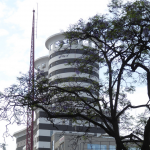As BBC restructures to cut around 450 jobs, the regional bureau in Nairobi, Kenya, has issued a notice to sack workers as part of its contribution to the global cost-reduction plan.
BBC News hopes to complete its £80 million savings target by 2022. BBC News currently employs around 6,000 people, including 1,700 outside the UK. Its budget after the changes will drop to around £480 million per year.
At the BBC East Africa Bureau, which is part of the BBC World Service Group, there are plans to fire an undisclosed number of employees across the departments, including four journalists.
Services being closed
“The BBC World Service Group is currently undergoing significant financial challenges, and all departments are required to deliver savings in order to future-proof the organization,” Ms Racheal Akidi, Head of East Africa Languages – BBC World Service, says in a notice seen by Business Today.
“The purpose of this letter is to formally notify you of our intention to terminate four (4) members of our staff on account of redundancy. Three (3) posts in the BBC Somali service and one (1) post in BBC Swahili service will be closed.”
The regional bureau in Nairobi has been in operation since 1995. It was expanded in 2018, backed with a hiring spree that saw the global media giant raid local TV stations for presenters and producers.
Ms Akidi says the strategy for achieving these savings while to reach BBC growth targets is to modernise operations, by focusing its limited resources on digital content production which has been identified as an area “with the greatest potential for growth.”
The restructuring at the Kenyan office will involve a reduction in radio output, delivering efficiencies across its operations and investing in carefully chosen digital products.
READ ALSO >> Meet the New Larry Madowo Who’s Got a Swag
These plans were communicated to all BBC East African Bureau staff on 26th November 2019 and a follow-up meeting with the affected staff and the BBC KUJ representative was held on 13th January 2020.
“We wish to assure you that the BBC will follow a fair and transparent ‘selection for retention’ process, taking into account the provisions of Section 40 (1) (a) of the Employment Act 2007 for termination on account of redundancy and the collective bargaining agreement signed between the BBC and the local trade union.
Outlets to be hit by job closures include BBC Two’s Newsnight, BBC Radio 5 Live and the World Update programme on the World ServicE.
But sources say the BBC management held the meeting with the KUJ representative at BBC without notifying the union’s secretariat before the notice was issued. It is understood there are consultations between the two parties over that breach of procedure to ensure the redundancy is handled fairly.
An international multimedia broadcaster with radio, TV, online and social media, BBC World Service Group says it has a weekly global audience of 320 million. BBC News currently employs around 6,000 people, including 1,700 outside the UK.
Changing audience ways
Its budget after the changes will be around £480m per year. The 450 job cuts include around 50 post closures at the World Service that were announced at the end of 2019.
Outlets to be hit by job closures include BBC Two’s Newsnight, BBC Radio 5 Live and the World Update programme on the World Service.
BBC News boss Fran Unsworth said there had to be a move away from traditional broadcasting and towards digital. But broadcasting union in the UK, Bectu, said the changes would mean staff will be “under even more pressure to deliver”, the BBC reported on its website.
The job cuts announced on 29th Wednesday include the previously announced closure of BBC Two’s Victoria Derbyshire programme.
SEE >> Nation Media Zeroes in on Five More Journalists to Sack
“The BBC has to face up to the changing way audiences are using us,” Unsworth, who is director of BBC News. “We need to reshape BBC News for the next decade in a way which saves substantial amounts of money. We are spending too much of our resources on traditional linear broadcasting and not enough on digital.”
The corporation announced in 2016 that it needed to save £800m, with around £80m of that figure coming from News. Just over £40m – around half – of the savings required in BBC News have already been found over the past four years.












Leave a comment